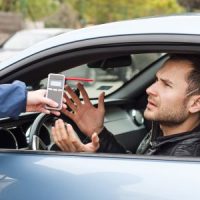What Are the Three Standard Field Sobriety Tests (FSTs)?

In the late 1970s, when DUI enforcement was sporadic at best, the National Highway Traffic Safety Administration developed a three-test battery to assess a suspect’s ability to multitask mentally and physically, and therefore safely drive a vehicle. Police officers arrest suspects, often whether or not they pass a chemical test, if they observe a certain number of clues. However, the correlation between these signs of intoxication and driving impairment is questionable, to say the least. More on that below.
For a Leesburg criminal defense lawyer, the administration of the three standard field sobriety tests may be the most important phase of a DUI arrest. Police officers always testify that subjects failed all three tests. But the jury reviews this video evidence and then decides whether the defendant passed or failed. The jury’s determination is the only one that counts. If a police officer falsely demanded a chemical sample, it looks like the officer was railroading the defendant. If the FSTs must serve as evidence of guilt, there’s usually insufficient evidence to convict defendants in these cases.
Horizontal Gaze Nystagmus
Usually, police officers lead with the HGN test, a/k/a the DUI eye test. This test has the highest compliance rate. It’s also the most scientifically unreliable FST.
The HGN test has a high compliance rate because many suspects don’t realize it’s a field test. Instead, they believe it’s a health examination. Once they determine its true purpose, their level of cooperation drops significantly. So, police officers reason that an HGN test result is better than no test result at all.
During this test, subjects must follow moving objects with their eyes without moving their heads. Involuntary pupil movements at certain viewing angles strongly indicate nystagmus, a condition that alcohol intoxication could cause.
That principle is solid. The connection between nystagmus and intoxication is less solid. Many people have nystagmus, but the symptoms are so mild they don’t know it. Therefore, they couldn’t pass an HGN test under any circumstances. Frequently, a Leesburg criminal defense lawyer partners with a doctor who makes an HGN diagnosis.
The HGN test is shaky in other areas as well. Therefore, many Loudoun County judges only allow prosecutors to use HGN test results for limited purposes.
One-Leg Stand
We mentioned physical/mental multitasking above. Scientifically, intoxicated individuals cannot walk and chew gum at the same time. Therefore, inability to multitask is a sure sign of intoxication, at least theoretically.
The physical component of the OLS is obvious. Subjects must elevate one leg at a certain angle for a certain number of seconds, usually about twenty, without swaying or using their arms or hands for balance. People in poor physical condition are often unable to physically perform this test under any circumstances.
Mentally, the officer looks for clues like elevating the wrong leg, dropping the leg too early, or otherwise failing to follow directions. Alcohol definitely affects concentration and similar functions. But so does nervousness, a language barrier, fatigue, and many other non-alcohol items.
Heel to Toe Walk
The HTW is very similar to the OLS in many ways. Physically, subjects must walk a straight line heel to toe without stumbling or swaying. Mentally, they must follow directions like starting with a certain foot and taking a designated number of steps.
This test also suffers from some of the same basic flaws as the OLS. People who aren’t wearing athletic shoes usually can’t walk heel to toe. That’s especially true if they must walk an imaginary line as opposed to a real line, or if field conditions are poor (dark, rainy, etc.)
Incidentally, many officers administer unapproved tests, like reciting part of the ABCs. These test results are inadmissible in court. But a Leesburg criminal defense lawyer often allows police officers to discuss the administration of these tests. Frequently, officers administer unapproved tests to fatigue defendants, mentally and physically, so they don’t perform as well on the tests that count.
Reach Out to a Savvy Loudoun County Lawyer
There’s a big difference between an arrest and a conviction in criminal law. For a confidential consultation with an experienced criminal defense attorney in Leesburg, contact Simms Showers, LLP, Attorneys at Law. We routinely handle matters throughout Northern Virginia.
Source:
nhtsa.gov/dwi-detection-and-standardized-field-sobriety-test-sfst-resources
